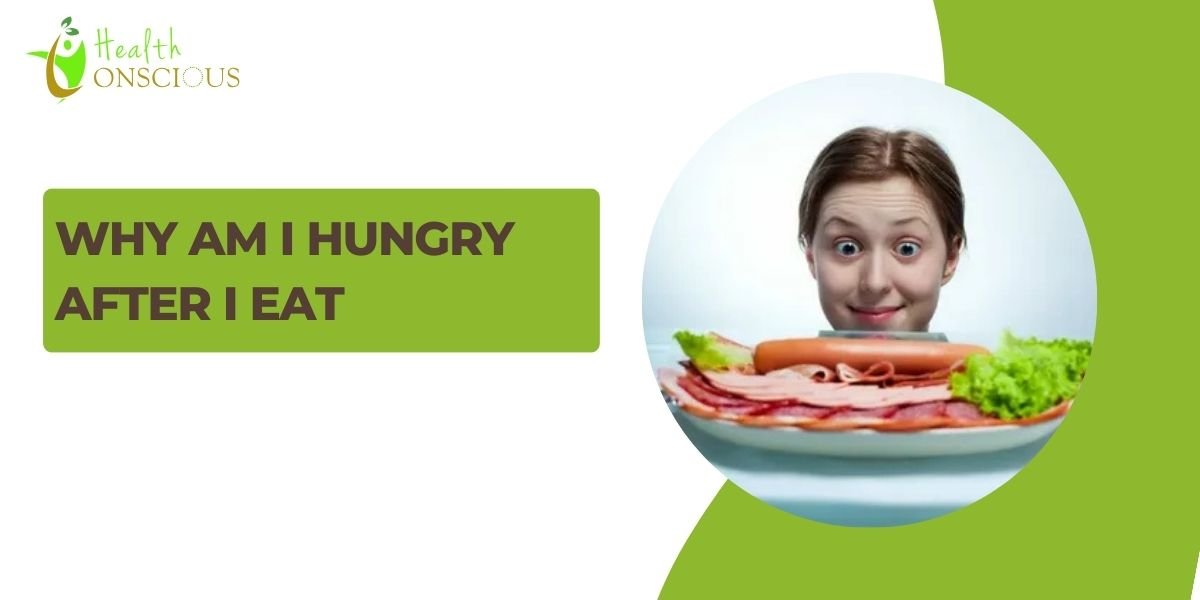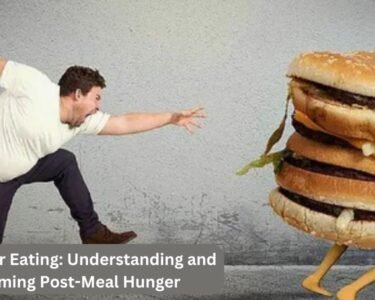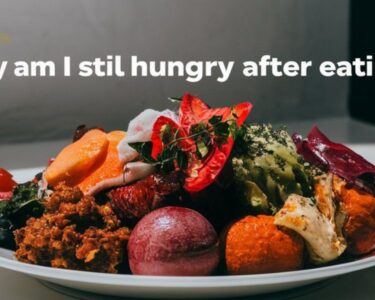Feeling hungry after eating can lead to the question, “Why am I hungry after I eat?” Several physiological and psychological factors, including the following, can trigger this sensation:
- Blood Sugar Spikes and Crashes: Eating foods high in refined carbs or sugar can cause a rapid spike in blood sugar, leading to a subsequent drop. This drop can trigger more hunger even shortly after eating.
- Low Protein or Fiber Intake: Protein and fiber promote fullness and slow digestion. If a meal lacks these nutrients, you may feel hungry again soon after eating.
- High-Glycemic Foods: Foods with a high glycemic index, such as white bread and pastries, digest quickly, leading to a quicker return to hunger.
- Not Enough Healthy Fats: Healthy fats slow digestion and increase satiety. Meals low in fat, especially calorie-restricted, might leave you less satisfied.
- Hormonal Factors: Hormones like ghrelin and leptin regulate hunger. Stress, lack of sleep, and other factors can disrupt these hormones, making it harder to feel full after eating.
- Psychological Factors: Sometimes, habits or cues—like food, stress, or emotional needs—can make you feel hungry even if your body doesn’t need more calories.
If this feeling persists, adjusting your meal composition and focusing on nutrient-dense foods can help you feel fuller longer.
Leptin
Body fat produces the hormone leptin, which controls your satisfaction after eating. You may have leptin resistance if you frequently ask yourself, “Why am I hungry after I eat?” even after eating.
Discover More:
Outcomes of Leptin Resistance
After eating, a person with normal leptin production won’t feel hungry until it’s time for another meal. This is because after you’ve eaten enough, your body releases leptin, which signals to your brain that you’re satisfied. Excess fat in the body disrupts the function of leptin. This results in leptin resistance, which makes one feel hungry even after they’ve eaten plenty.
An excess of leptin in the bloodstream affects the following body parts:
- When the circulation has too much leptin, the body’s cells get overloaded and shut down their leptin receptors, resulting in leptin resistance. When leptin is not entering cells, the brain never receives the signal that it is full, which increases the likelihood of overeating.
- Leptin encourages more fat accumulation.
- Additionally, leptin influences puberty, libido, and fertility. Obese females are 80% more likely to experience puberty sooner than average, which may be due to leptin resistance.
There is a correlation between elevated triglyceride and leptin levels.
The struggle against overeating involves more than just leptin resistance. Research has shown that elevated triglycerides hinder leptin’s ability to transmit its hunger signal to the brain through the blood-brain barrier, a thin membrane that protects the brain. This could help answer the common question, Why am I hungry after I eat? Bread, pasta, rice, potatoes, and other meals high in sugar and carbohydrates cause triglycerides to rise significantly, which prevents leptin from telling your brain when you’re full.
Diet for Leptin Resistance
One strategy to return leptin levels to normal may be diet. Excessive consumption of sweets and potatoes can result in elevated triglycerides, leptin resistance, and therefore, feelings of hunger and strong cravings for food. Therefore, following a leptin-sensitive diet that aids in weight loss is the key to reversing leptin resistance.
Try including the following foods in your diet to help you overcome leptin resistance:
Give up drinks and sweets. Research has shown that sugar and corn syrup directly heighten the brain’s resistance to leptin. This could potentially answer the question, “Why am I hungry after I eat?” Additionally, sweets increase triglycerides, which prevents leptin from reaching the brain.
Eat less carbohydrates. Pasta, rice, bread, potatoes, maize, and pastries are examples of starchy foods that raise insulin and blood sugar levels. Consequently, leptin levels rise.
Eat foods high in healthy fats, such as avocado, salmon, ghee, and raw olive oil. Sufficient, healthy lipids activate leptin’s satiety switch.
Think about taking a supplement containing fish or krill oil. Omega-3 fatty acids modulate leptin.
Regular exercise, particularly strength and interval training, can also lower leptin levels.
Source: What Is Leptin?
To prevent you from mindlessly eating at all hours, we have broken down the common reasons for your hunger symptoms and how to solve them.
You’re exercising too much.
Increased exercise may increase your appetite, prompting you to ask yourself, “Why am I still hungry after eating?” Whether you’re starting a walking routine using the Aptiv app or increasing your miles for a marathon, it can lead to increased food cravings.
“Adding intervals or extending your usual workout by ten minutes may only result in an additional 50 or 150 calories burned, but it can significantly increase your appetite.” “You may be extremely hungry,” Lakatos Shames explains.
You may easily ingest many more calories than you just burned, so exercise caution. She has observed that individuals who begin walking daily ingest an additional 300 calories but burn only around one-third of that amount.
She recommends determining whether consuming additional food is truly necessary and how much more exercise you’re getting using our favorite tracker.
Your diet is low in protein.
“We frequently have customers who eat salad for lunch, which is high in greens but low in protein, so it doesn’t provide enough to satisfy them,” Lakatos explains. Lakatos explains.
The significance of protein lies in its taste. It takes four to six hours to digest, compared to one to three hours for carbohydrates.
Additionally, protein and fiber control blood sugar levels, preventing crashes right after meals. Try to get 20 grams of protein at each meal.
You need more fiber in your diet.
why am I hungry after I eat? According to Jen Bruning, R.D.N., media spokesman for the Academy of Nutrition and Dietetics, “Fiber is your friend when it relates to staying full without adding calories.”
“Fibre helps us feel fuller for longer, but it doesn’t add calories to our meals because we can’t fully digest it.” Her recommendation is to replace low-fiber meals with higher-fiber ones (for example, try whole-wheat bread instead of white bread).
Additionally, make an effort to include fiber (found in whole grains, nuts, seeds, and whole fruits and vegetables) and lean protein in every meal and snack. According to Lakatos Shames, you should generally strive for 5 to 6 grams of fiber every single meal or snack, or 20 to 25 grams daily.
You need to drink more water.
“This is significant, particularly if you exercised that day and may not have properly hydrated before, during, or after your workout. Lakatos claims that a lot of individuals mistake thirst for hunger when they’re just thirsty, often leading them to ask, Why am I hungry after I eat? Water naturally helps you feel fuller since it takes up space in your stomach. But because it expands the fiber you’ve consumed, it also keeps you feeling full. Drinking extra water also helps with digestion.
“Try taking a glass or two of water and see if that helps if you’re hungry at a time that doesn’t make sense to you, like if you’ve eaten recently,” advises Bruning. According to Bruning, you should look at the color of your urine to make sure you’re drinking enough water overall. It ought to be light yellow.”
You’re eating for emotional reasons.
Do you think I’m hungry? “People can be so disconnected from their hunger at times—sometimes it’s emotional hunger,” Lakatos explains.
To find out if your hunger is due to emotions, think about eating carrots. “You’re not hungry if those don’t sound appetizing,” she explains.
According to Bruning, feeling exhausted or sleepy may also be a contributing factor. When we don’t get enough sleep, we can produce higher levels of ghrelin, a hormone that makes us feel hungry.
Your medication is increasing your appetite.
why am I still hungry after eating? Antidepressants and other drugs can occasionally actually enhance appetite. After a meal, some antidepressant users report never feeling full and specifically wanting more carbohydrates.
Discuss all your medications with your doctor if you’re always hungry.
A solution could exist that will prevent you from feeling dissatisfied and hankering for all the goodies. Seeing a doctor may still be wise, even if you are not on medication and have persistent hunger.
According to Bruning, the cause can be an undiagnosed medical condition. Increased appetite may be a sign of diabetes, especially if it comes along with weight loss or excessive thirst. Another underlying reason may be hyperthyroidism.
You seem a bit undernourished.
When customers tell Bruning they’re hungry immediately after eating, she says this is usually the reason behind the question, Why am I hungry after eating? “People just eating enough to power themselves through the day is what I see the most,” she adds. “It usually occurs when they are on a restrictive diet, which excludes entire food groups or has them consume too few calories.”
Discuss your diet with a dietitian when you meet with them. They will be able to determine what is lacking in your diet to help you feel content and full while reducing your snacking.
If you find yourself feeling hungry immediately after eating, consider all eight of these factors. Pay attention to the meals you eat as well as the quantity you consume.
See your doctor if you frequently feel hungry after eating to rule out a deeper health issue as the cause of your problem.




